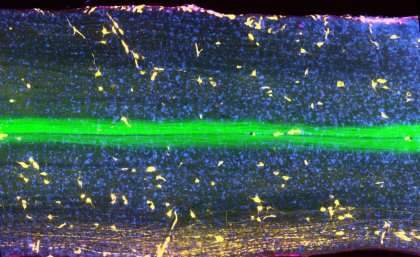A slice through a spinal column showing the physical connection that links the brain to muscles.
Motor neurone disease may still be considered a certain and unpleasant death sentence, but researchers at The University of Queensland are testing a promising treatment option.
Professor Elizabeth Coulson, from the UQ School of Biomedical Sciences and the Queensland Brain Institute (QBI) says a very early candidate drug has led to positive results in mice with MND, a disease that diminishes the ability to move and, eventually, breathe.
"We've had encouraging positive results in MND mice, showing that we could keep dying motor neurons alive for longer and delay disease onset," Professor Coulson said.
The team found a particular protein linked to MND, called p75, could be affected by the drug.
"We've triggered a cell survival-signalling pathway and blocked a cell death-signal pathway used by the p75 protein to kill dying motor neurons.
Collaborators from the University of Adelaide found that a by-product of this protein was found in high levels in people with MND, and could be measured in urine and blood.
Professor Coulson said testing showed less of this by-product in mice that received treatment, indicating that motor neuron degeneration was not being activated to the same extent.
"The drop in by-product output fitted with the idea that we were affecting the pathway in which we were interested," she said.
"This validates investigating p75 not only as a drug target, but also as a marker for the extent of motor neuron degeneration."
Professor Coulson said both the drug and the by-product could be applicable for other neuronal degenerative diseases, such as Alzheimer's disease or after a stroke.
"At this stage, the drug is a peptide and it is degraded by the body very quickly, but we're actually really encouraged that something with such poor stability displayed real potential," she said.
"I've been working on MND for almost 20 years and, if we can make this peptide stable and in the right drug form, we could be looking at an available treatment in two to 10 years.
"There are a lot of 'ifs'—one of which is that the drug might not work in humans with MND—but the mechanism of action revealed by the study, the way the drug works, should mean it could also be effective in Alzheimer's and general dementia by promoting cognitive enhancement as well as slowing cell degeneration."
The study is available online in the Journal of Cell Science.
More information: D. Matusica et al. Inhibition of motor neuron death in vitro and in vivo by a p75 neurotrophin receptor intracellular domain fragment, Journal of Cell Science (2015). DOI: 10.1242/jcs.173864
Journal information: Journal of Cell Science
Provided by University of Queensland





















